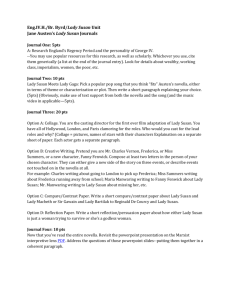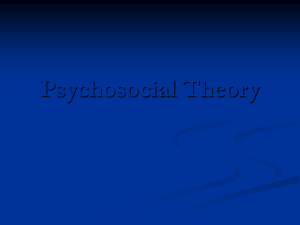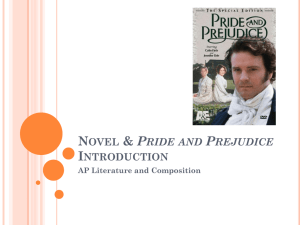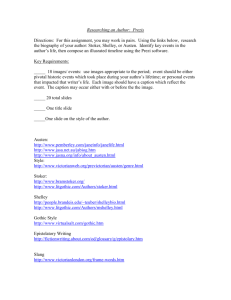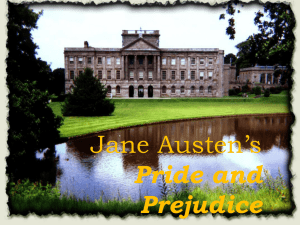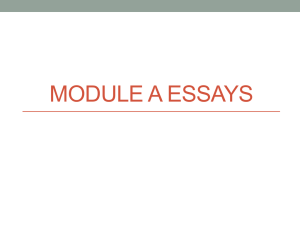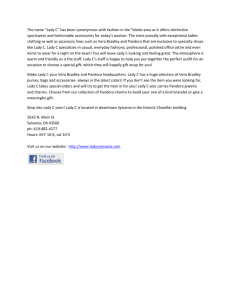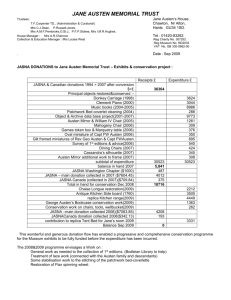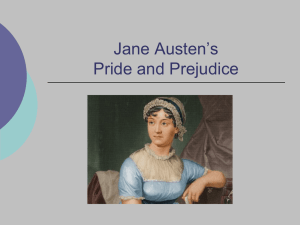Jessica Williams ENGL 373KK Library Paper October 27th, 2015
advertisement
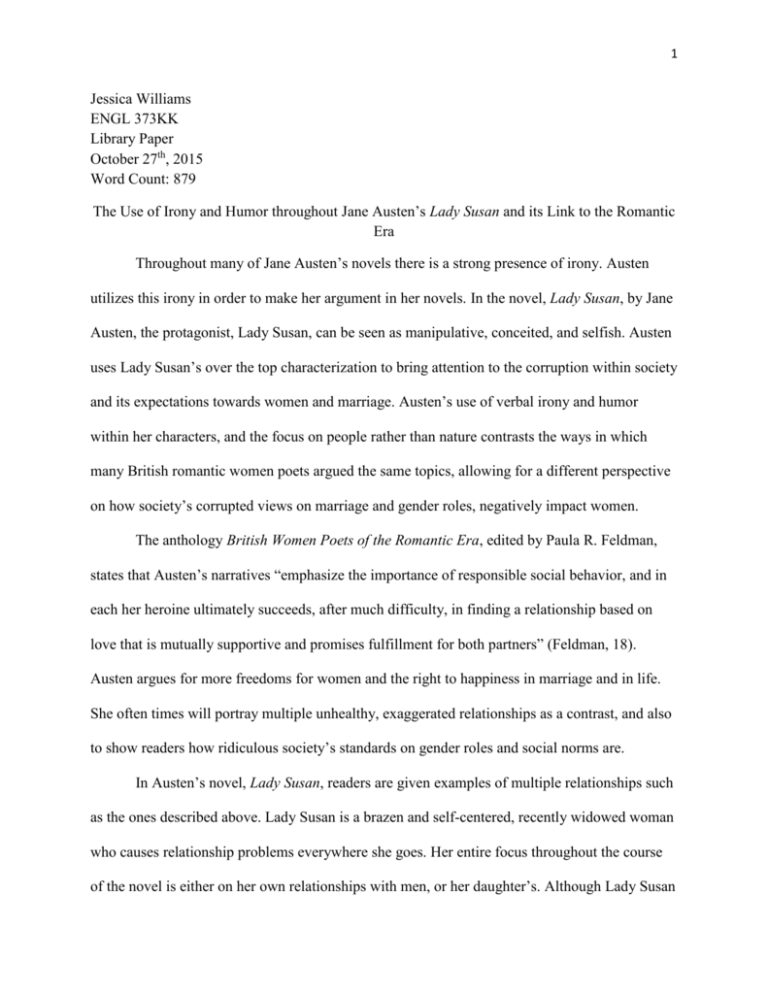
1 Jessica Williams ENGL 373KK Library Paper October 27th, 2015 Word Count: 879 The Use of Irony and Humor throughout Jane Austen’s Lady Susan and its Link to the Romantic Era Throughout many of Jane Austen’s novels there is a strong presence of irony. Austen utilizes this irony in order to make her argument in her novels. In the novel, Lady Susan, by Jane Austen, the protagonist, Lady Susan, can be seen as manipulative, conceited, and selfish. Austen uses Lady Susan’s over the top characterization to bring attention to the corruption within society and its expectations towards women and marriage. Austen’s use of verbal irony and humor within her characters, and the focus on people rather than nature contrasts the ways in which many British romantic women poets argued the same topics, allowing for a different perspective on how society’s corrupted views on marriage and gender roles, negatively impact women. The anthology British Women Poets of the Romantic Era, edited by Paula R. Feldman, states that Austen’s narratives “emphasize the importance of responsible social behavior, and in each her heroine ultimately succeeds, after much difficulty, in finding a relationship based on love that is mutually supportive and promises fulfillment for both partners” (Feldman, 18). Austen argues for more freedoms for women and the right to happiness in marriage and in life. She often times will portray multiple unhealthy, exaggerated relationships as a contrast, and also to show readers how ridiculous society’s standards on gender roles and social norms are. In Austen’s novel, Lady Susan, readers are given examples of multiple relationships such as the ones described above. Lady Susan is a brazen and self-centered, recently widowed woman who causes relationship problems everywhere she goes. Her entire focus throughout the course of the novel is either on her own relationships with men, or her daughter’s. Although Lady Susan 2 has just recently lost her husband, she is already pursuing a relationship with a married man, named Manwaring. In Lady Susan’s letter to Mrs. Johnson she says that “Mrs. Manwaring insupportably jealous; so jealous in short, and so enraged against me” (Austen, 5). Lady Susan’s blatant character flaws are humorous, and the irony is enjoyable for readers on the surface, but this irony and humor can also be used to send a message to readers about the corruption of society’s treatment of women and views on marriage. We have another example of this when Lady Susan writes “Sir James did make proposals to me for Frederica – but Frederica, who was born to be the torment of my life, chose to set herself so violently against the match” (Austen, 5). Rather than allow and respect Frederica’s choice to marry the man she chooses and loves, Lady Susan feels the need to get involved and try to force an undesired marriage on her daughter. Once again it is described with such humor that readers can both laugh, while also see how ridiculous of a societal standard it is. Jane Austen’s novels, specifically Lady Susan, “focus on a woman’s world-view, and readers are made well aware of her circumscribed space and limited options,” but she does this through creating humor using flawed and ironic characters and situations (Feldman, 18). This contrasts the perspective given by many British women poets during the romantic era. Poets such as Charlotte Smith and Anna Seaward place a much greater emphasis on nature rather than people and their interactions, which is something that Austen does not do at all in her novel Lady Susan. Many women poets during this time also are a lot more sorrowful and gloomy in their poems in order to express their thoughts and make their point. In Mary Robinson’s poem “The Lady of the Black Tower,” the narrator is dreaming about her love, but Robinson describes the scene and event using dreary and dark diction such as when she describes the “pale moon,” the “dreary forest,” and the “hollow sound” (Robinson, 640). Not only is the poem more sad and 3 dark, but the sanity of the narrator is also questionable, leaving readers unable to know the actual turn of events. In Caroline Norton’s poem “The Faithless Knight” we have another woman narrator who seems to be sitting staring out a window pining after her love. While this poem is not as dark, it still presents a helpless woman deceiving herself of reality. Both poems send a message on love and women’s freedoms within society’s expectations for them regarding love and marriage, but they do not use humor or irony, like that which was portrayed in Lady Susan, to express their message. Ultimately both the poems and the novel, Lady Susan, send strong messages on the corruption within society regarding social norms and women’s rights; however, both use different ways to accomplish this. In both the novel and the poems there are women being disregarded because they are doing what society expects from them and are isolated and shut away. Frederica is shy and simply wants to be happy and have a right to choose who she marries and Lady Susan wants nothing of it, under the presumption, set by society, that it is much more important to marry a wealthy, highly esteemed man. Austen’s irony and humor alongside Norton’s and Robinson’s darker lens throughout their poems, allows for a different portrayal on marriage and women’s roles within society; however, both ultimately are arguing for the same things, which allows their message to reach a broader audience. 4 Works Cited Austen, Jane. Lady Susan. London: Oxford UP, 1871. Print. "Jane Austen." British Women Poets of the Romantic Era: An Anthology. Ed. Paula R. Feldman. Baltimore, MD: Johns Hopkins UP, 1997. 16-19. Print. Robinson, Mary. "The Lady of the Black Tower" British Women Poets of the Romantic Era: An Anthology. Ed. Paula R. Feldman. Baltimore, MD: Johns Hopkins UP, 1997. 639-43. Print. “I hereby declare, upon my word of honor, that I have neither given nor received unauthorized help on this work.” Jessica Williams
